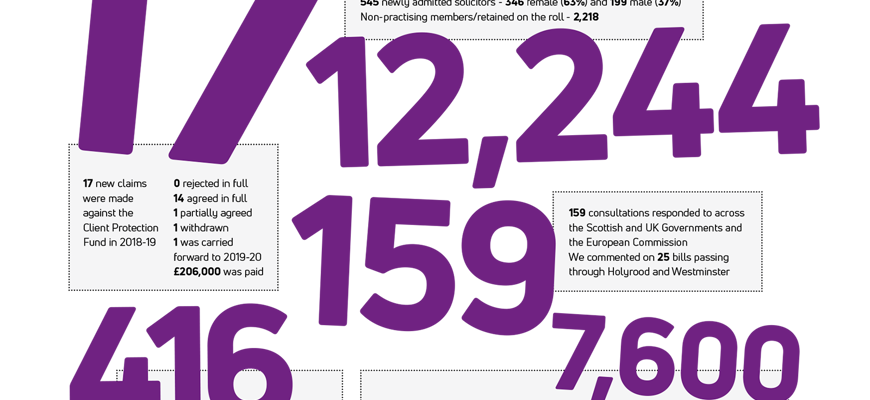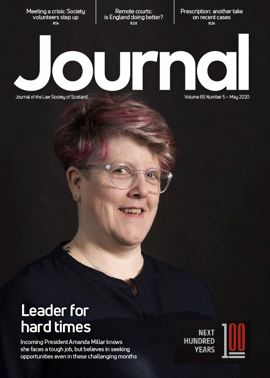Platinum edged: the year that was

Much of the 2018-19 operating year focused on the review and reform of legal services regulation, following the publication of the Fit for the Future report in late 2018. The Society continued to engage with members, stakeholders and Government, and joined the Scottish Government’s working group on the matter.
In addition, 70th anniversary celebrations, Brexit and Anti-Money Laundering Regulations all played key roles in the Society’s work. The Lawscot Foundation secured two new sponsors and welcomed eight new students to the scheme, bringing the total number of students supported to 25; and an exciting new partnership with RARE was entered into, piloting a contextualised recruitment system to help improve the chances for less-advantaged young people to get into a career in the legal sector.
John Mulholland, President
“This report is being published at a time of extreme financial challenge for the legal sector, with court work suspended and the sudden halt to the property market. Firms have been furloughing staff and deferring traineeships, seeking to control costs, with much uncertainty around what the long term impact of this pandemic is going to be. The outbreak has inevitably and dramatically changed our planning for next year. Our priority is to do all we can to support and guide our 12,000 members through these difficult and unprecedented times.
“Throughout our last operating year, the review and reform of legal services regulation in Scotland continued to play a major part in our work. We continued to advocate for change that will better serve the public and the profession than the creation of a single regulator of legal services, one of the Legal Services Review report’s main recommendations. We engaged extensively with our members, stakeholders, other professional bodies and MSPs and we sit on the Scottish Government’s working group, whose aim it is to reach a consensus on models which will deliver reforms to legal services regulation. We expect the agreed models to be put out to consultation by the middle of this year.
“We provided advice and guidance on Brexit throughout the year, and produced a series of webinars looking at the impact of the UK’s departure from the EU on Scots law and legal practice. We will continue to provide that support and guidance throughout the transition period.
“We welcomed a 3% rise in legal aid fees in April 2019, but it’s important that this is recognised as a short term rise and a step towards a more appropriate rate of remuneration for solicitors. Building a fairer and simpler legal aid system is essential, and in our response to the Scottish Government consultation on legal aid reform, we highlighted the importance of making the legal aid system more efficient and easier to navigate for members of the public and solicitors alike.
“Of course we also celebrated the Law Society’s 70th anniversary, and it was an honour to have been Vice President and then President through the period of celebration.”
Lorna Jack, chief executive
“Our profession is currently facing a historic challenge, with the coronavirus pandemic requiring flexibility, resilience and innovation from our members across Scotland and beyond.
“At the Law Society, we have responded by looking carefully at our own costs, furloughing staff through the UK Government Job Retention Scheme, freezing staff recruitment and re-balancing our budgets to reduce discretionary spend. Meanwhile, our staff continue to work with our President and Council to provide members with a wide package of support and guidance. We have a clear statutory objective to ensure Scotland has a strong, varied and effective legal profession. This will remain our top priority over the coming year.
“Back in January, we kicked our platinum celebrations off by welcoming more than 200 women to our offices at Atria One to have their photograph taken as part of the First 100 Years project.
“Further events followed throughout the year, culminating in our platinum themed annual conference in October.
“While not quite meeting all of our ambitious membership growth targets, our numbers did increase across all categories, with practising members surpassing the 12,000 mark for the first time. We also launched two new categories – Legal Technologists and Fellows, the latter for retired members.
“We continued to take our responsibilities as an anti-money laundering (AML) supervisor extremely seriously and made significant progress against the objectives we set out for ourselves in response to our 2018 review by the Office for Professional Body Anti-Money Laundering Supervision (OPBAS).
“And we delivered a major project to integrate the Journal Online website into our own, improving the way in which we are able to share news, updates and information with our members.”
Craig Cathcart, Regulatory Committee convener
“In the interesting times in which we live, the committee has continued to give thought to how 21st century regulation should look, supporting the profession and protecting the public interest through consistent, accountable and proportionate measures.
“The first half of our operating year focused on the Legal Services Review report, which published in late 2018. We welcomed much of it, including the recommendations for improved regulation of entities and broader cross-border regulation. We especially welcomed its recognition that the current complaints system is not fit for purpose, being costly, complex and time consuming. Many of the proposals in the report reflected the suggestions which have been pursued by the committee for some time.
“However, the committee believed the report failed to provide a convincing argument or detailed evidence to support the core proposal of creating a new single independent regulator of legal services. We now look forward to the Scottish Government consulting further and the committee having the opportunity to submit additional proposals ahead of new legislation.
“Anti-money laundering has continued to be a key area of focus, and the committee ensured delivery of an action plan to implement recommendations made by Office of Professional Body Anti-money laundering Supervisors (OPBAS). We formed a new standalone regulatory subcommittee to deal with this complex landscape and oversee the specialist work required.
“Other key areas of work have included improving the current complaints process, and our work on price transparency within the legal services market. We also responded to several consultations, as ever balancing the professional and public interest, and seeking to achieve public confidence in how we regulate our vital legal profession. You can read the full report on my first year as the Regulatory Committee’s convener at www.lawscot.org.uk/annualreport.”
Graham Watson, Finance Committee convener and treasurer
“The past few months have been quite exceptional and have had a significant and detrimental impact on the financial position and future financial prospects of the Society. The pre-COVID-19 budget for the Society assumed a breakeven position for the financial year ending 31 October 2020, with a modest contingency for unforeseen events. As a result of the crisis, the Society has been forced to take immediate action to reduce its cost base and conserve cash.
“Since receipt of most of the Society’s income predates the crisis, it is still the expectation that with careful cost control, a broadly breakeven position, prior to recognising the effects of the pandemic on the Society’s investment portfolio, will be the outturn this year. Of course, given that the final position will involve a snapshot of the value of the investment portfolio on 31 October, it is quite possible that a significant deficit will be reported if global stock markets do not see a post-COVID-19 rebound by the year end.
“Of much greater concern is the effect of the crisis on the Society’s financial position beyond 31 October 2020. The forward picture looks very challenging, especially in view of Council’s decision to reduce 2020-21 fees due from members. The Society’s scope of work and its associated cost base for the following year, will require additional scrutiny and careful management as a consequence of providing this much needed relief to members, in order to deliver an acceptable financial outturn for 2020-21.”
Perspectives
Features
Briefings
- Steps to restraining the press
- The CJRS: a developing picture
- COVID-19 and AWI: the Society's blueprint
- Give me liberty or give me an ECHR-compliant lockdown!
- Pensions and the pandemic
- Secure digital signatures: moving forward in a crisis
- PSG: progress during the pandemic
- In-house, from home
- Scottish Solicitors' Discipline Tribunal






